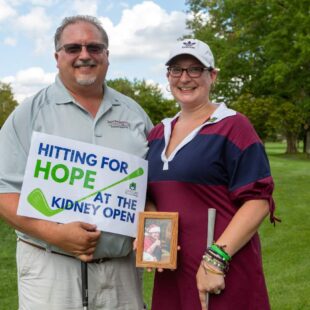Emotional Health for Transplant Caregivers
As a transplant caregiver, you may be more focused on keeping the patient in good spirits or focused on keeping your family together, rather than your own needs and what makes you happy.
Transplant caregivers have so many caregiving and personal responsibilities that they sometimes forget to take care of themselves and do things they once enjoyed. It can be very helpful just to give yourself time each day to do things you love to take your mind away from the other issues. If you find that time alone does not alleviate your feelings of sadness then maybe support from your doctor or a counselor will help.
The Department of Health and Human Services (2003) reported that caregivers were two times more likely to be depressed than non-caregivers. Other studies state that caregivers are less likely to go to the doctor’s as needed and are more likely to have issues with their insurance; therefore it would be assumed caregivers would have more difficulty receiving treatment for depression. Additionally, many caregivers assume their symptoms (fatigue, weight loss, sleep deprivation, sadness, etc.) are normal symptoms of a caregiver and do not associate those symptoms with depression or sadness.
Before attempting to identify yourself as depressed it is necessary to understand what clinical depression is and how it differs from being sad, overwhelmed and stressed out.
If you have major depressive disorder, you will experience at least five or more of the following symptoms, which have been present during the same two week period, and at least one of the symptoms is a depressed mood or loss of interest or pleasure.
- Depressed mood most of the day, nearly every day, as suggested by yourself or others
- Visibly lessened interest or pleasure in almost all activities most of the day, nearly every day
- Large weight loss when not dieting or weight gain or decreased or increased appetite nearly every day
- Inability to get enough sleep or you sleep for excessive hours at a time nearly every day
- Psychomotor agitation (a series of unintentional and purposeless motions) or psychomotor retardation (slowing down of thought and a reduction of physical movements) nearly every day
- Fatigue or loss of energy nearly every day
- Feelings of worthlessness or excessive or inappropriate guilt nearly every day
- Diminished ability to think or concentrate, or indecisiveness, nearly every day
- Recurrent thoughts of death or suicidal ideation
Also, major depressive disorder will cause significant impairment in social, occupational and other important areas of functioning.
You may have many of those symptoms, but not during the same two week period and you are still feeling somewhat sad and overwhelmed with being a transplant caregiver. Your feelings are valid and you deserve to be happy, whether you meet the qualifications or not. It is always important to talk to your doctor about your feelings so they can discuss some options to feel better. Just because you are not classified as having depression does not mean it may not be helpful to talk to a counselor. Sometimes just being able to get your feelings out can be very helpful, and a counselor will not judge you or give you advice. Also try to do fun things every day, even if it is only for an hour a day. It is important to remember why you enjoy life. If your feelings of sadness are not going away then take your treatment a step further: meet with a counselor regularly; discuss anti-depressants with your doctor; or change your lifestyle and incorporate healthy habits into your life, like exercise and good nutrition. Feelings of sadness, being overwhelmed or fatigue should not be ignored, and if ignored they could turn into major depressive disorder or cause other physical/medical issues. For instance, fatigue may be normal for caregivers, but it should not go untreated.
See Physical Health for Transplant Caregivers for more information on fatigue.
If you or a loved one ever have any thoughts of suicide, call 911 or go to your local hospital emergency room (ER) immediately for help.
Counseling
Individual counseling or support groups have gotten a bad reputation, as people tend to think those who need counseling are “crazy.” Counseling and support groups can be very beneficial to many people. Counseling and support groups allow people the ability to talk to a nonjudgmental person and work out issues in their lives that they are having trouble coping with on their own. For instance, a counselor or therapist may be able to assist a person in identifying coping skills that they never realized they had. Counselors or therapists typically do not give advice, but can assist people in seeing things they may not have seen on their own. Sometimes people just need some to talk to someone who will not judge them or give advice, which many times friends and family members do.
There are many different ways to find an appropriate counselor or therapist. Many private insurances cover behavioral health, such as counseling, mental health, and drug and alcohol treatment. You can contact your health insurance customer service department and ask to speak with someone about behavioral health benefits. Many companies and employers also now provide employees with “employee assistance programs” which can give discounts for counseling as well. Many support groups are actually free and insurance is not required. It may be difficult to locate a transplant caregiver support group, but there are general caregiver support groups out there that can be just as helpful. Also, many hospitals provide transplant support groups that you and the patient could attend together. When you cannot afford to see a private counselor, and your insurance will not provide assistance, many counties and cities have a wide variety of social service agencies that may provide support. Speak to your transplant social worker for some suggestions, or contact your local city or county office for a list of social service agencies in your area. Sometimes the toughest thing is asking for help, but there are many people out there who want to help and can provide the support you’re searching for.
Anti-Depressants
Another way to treat depression is anti-depressants. An anti-depressant medication is a prescription medication that can be received through a doctor to physiologically address depression by regulating serotonin, norepinephrine or dopamine levels in the brain. Different anti-depressants address different chemicals in the brain. Though they all work to address your mood, it is important to talk with your doctor about your symptoms so he can refer you to a psychiatrist or prescribe you the right medication.
Many people are reluctant to try anti-depressants because they do not want to feel “high,” become addicted or deal with the side effects many medications have. Anti-depressants are not tranquilizers so people do not tend to feel a “high” when taking them, as long as they are taken as prescribed. Also, addiction to anti-depressants is not typical as long as they are taken as prescribed. Though anti-depressants may have side effects, just as most medications do, government research through the Agency for Healthcare Research and Quality found people typically only experience one side-effect when taking anti-depressants. Again, it is important that your doctor be informed of any side-effects or unwanted feelings while taking anti-depressants because medications work differently in all people. Your doctor can instruct you on the appropriate dose or medication, though different ones may need to be tried before finding the right one for you. The Agency for Healthcare Research and Quality also found that 6 out of 10 individuals do feel better with the first antidepressant they try, whereas the other people tend to need to try different anti-depressants before finding the right one for them.
How will you know if your anti-depressant is working? The symptoms that you previously had due to depression will begin to improve. For instance, you may begin to sleep better, you may become more engaged in your life and have increased interest in your previous hobbies, or your weight may begin to regulate and your eating habits improve. Improvement can take some time; many people feel better after about 6 weeks of taking anti-depressants, but it could take longer. If you feel it is taking too long, talk to your doctor so he can make changes to your dosage or medication if needed. Many people also need to continue to take these medications for at least 6-9 months.
Anti-depressants are an effective and easy way to treat depression. You will have the support from your doctor throughout taking the medications so you don’t have to feel alone any longer. It is important to remember to take the medication exactly how the doctor prescribes and if you are unhappy with the medication do not stop taking it abruptly; always talk to your doctor before making any changes and allow your doctor to assist in leading you in the best direction to better health and happiness.
Exercise and Nutrition
“What does exercise have to do with depression?” There are many studies that show that adequate exercise can increase mood and lessen depression.
One study by Roth and Holmes (1985) found that individuals with lower levels of physical fitness who experienced high stress were also more likely to experience more symptoms of depression, and those who had higher levels of physical fitness and higher stress levels experienced fewer symptoms of depression. This study helps indicate that with the addition of physical fitness to one’s life, depression can be less likely when dealing with highly stressful events.
Taylor et al (1985) proposes that the psychological benefits of exercise are very positive, and can assist in decreasing: alcohol abuse, absenteeism at work, anger, anxiety, confusion, depression, headaches, hostility, phobias, stress, tension and work errors. Furthermore exercise can assist in showing an increase in: academic performance, confidence, emotional stability, independence, intellectual functioning, memory, mood, perception, positive body image and well-being.
Depression many times can cause insomnia and sleep disturbances, which can be extremely detrimental to one’s health as well as day-to-day lifestyle. However some studies even show exercise can help with depression and sleep disturbances or insomnia. King et al (1997) found that exercise improved sleep disturbances in men and women ages 50-76. Likewise Singh et al (1997) found that after a 10-week exercise program of weight training three times per week, men and women significantly improved in their sleep quality and depression measure.
It is also important to recognize that for exercise programs to be successful with the hopes of positive psychological outcomes, exercise must be enjoyable and manageable. For instance, consider exercising with a group of friends or joining exercise classes. The exercise regimen must also be incorporated into one’s life reasonably, and not as an additional task that seems impossible to complete. Without manageable, enjoyable exercise programs, it is more likely that the exercise program will fail, which could lead to negative psychological effects.
It is very important to always talk with your doctor when starting a new exercise plan. Similar goes for transplant patients.







